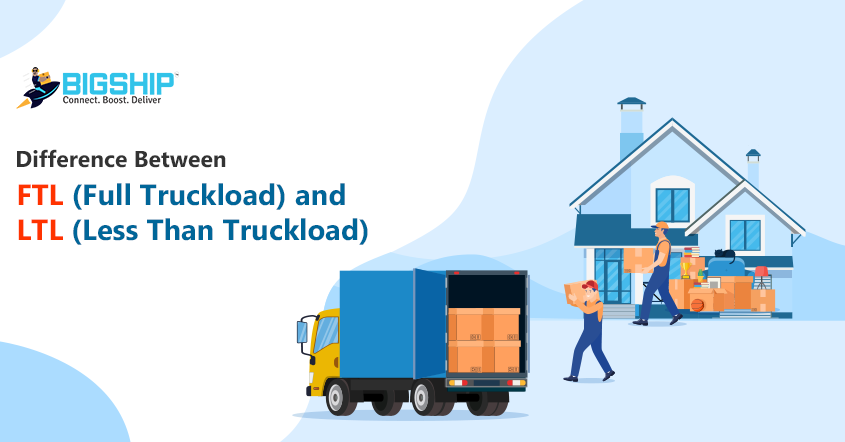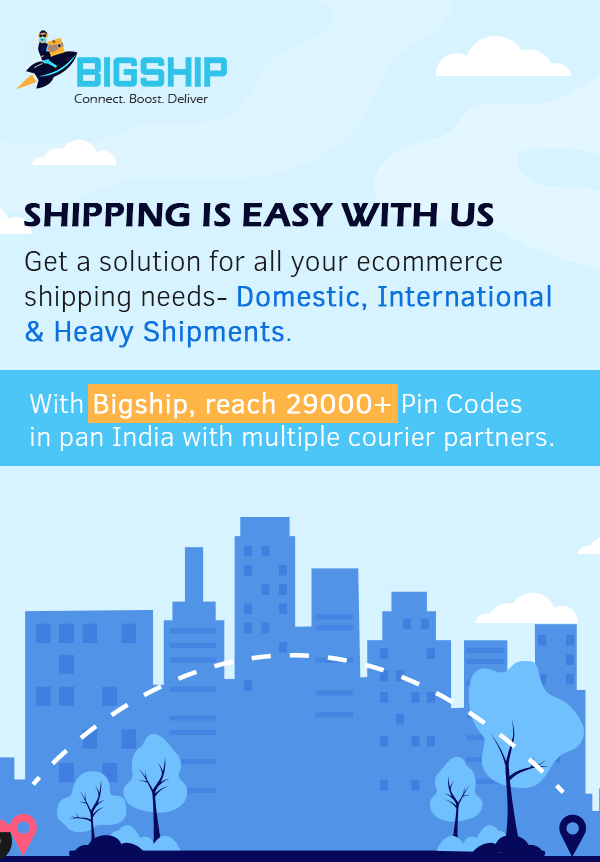Difference Between LTL and FTL: What To Choose?

Contents:
2. What is FTL Shipping?
3. Understanding Delhivery LTL Services
4. Understanding Delhivery FTL Services
5. Key Differences between Delhivery LTL and FTL Services
6. Pros and Cons of LTL and FTL
6.1 Advantages of LTL Services
6.2 Disadvantages of LTL Services
6.3 Advantages of FTL Services
6.4 Disadvantages of FTL Services
7. Conclusion
8. FAQs
Delhivery is a prominent Indian logistics and supply chain service provider that was established in the year 2011. It is headquartered in Gurugram, Haryana. Delhivery offers a comprehensive range of services such as LTL and FTL. BigShip, India’s prominent courier aggregator, is also providing Delhivery LTL services. You can check BigShip’s website or application in order to book Delhivery LTL, as per your requirement.
Selecting the appropriate shipping service, whether Less Than Truckload (LTL) or Full Truckload (FTL), is vital in optimizing logistics operations. The choice impacts costs, transit times, and overall efficiency. In this article, we’ll explore key differences between Delhivery LTL shipping and Delhivery FTL shipping, when to use which shipping services, and the advantages of each service.
What is LTL Shipping?
LTL Freight Shipping service is a cost-effective and efficient logistics service. It consolidates multiple small shipments from various clients into a single truckload to optimize and minimize transportation costs. LTL shipping is ideal for shippers with smaller loads that don’t require an entire truck, usually weighing between 20 Kg to 5,000 Kg.
What is FTL Shipping?
FTL Freight Shipping is a service in logistics where a single shipment usually takes up an entire truck or shipping container. This method is ideal for companies with substantial cargo quantities. Full Truck Load shipping service ensures efficient as well as secured transportation. The weight range in FTL freight shipping ranges between 5,000 Kg to 24,000 Kg.
Understanding Delhivery LTL Services
Less Than Truckload shipping (LTL) is a highly efficient and cost-effective freight transport method, particularly when dealing with smaller shipments. Understanding how Delhivery LTL freight shipping works is essential when optimizing logistics and reducing transportation costs. Delhivery LTL carriers operate by consolidating multiple smaller shipments from various shippers into a single truckload. This allows carriers to maximize the use of available truck space, resulting in reduced costs for both the carrier and the shipper.
The Delhivery LTL process begins with shippers preparing their freight for shipment. Each shipment is segregated based on factors like weight, dimensions, and distance. Carriers then pick up these shipments and transport them to a regional terminal. At the terminal, the shipments are sorted and combined into truckloads based on their destination. The optimized loads are then sent out for delivery, making multiple stops along the route to drop off various shipments.
Understanding Delhivery FTL Services
Full Truckload shipping (FTL) is a freight transportation method where an entire truck is dedicated to the shipment of a single client’s cargo. Understanding how Delhivery FTL shipping works is crucial for businesses that require the exclusive use of a truck and seek efficient, secure, and timely transportation of their goods. Delhivery FTL shipments are typically used when the cargo volume is substantial and requires the full capacity of a truck.
The Delhivery FTL process begins with the client preparing their goods for shipment in a properly packaged and secured manner. Once the cargo is ready, the FTL carrier picks it up directly from the shipper’s location without the need for consolidation. This reduced handling minimizes the risk of damage and contributes to faster transit times.
Key Differences between Delhivery LTL and FTL Services
Delhivery’s LTL and FTL services offer distinct advantages and are tailored to different shipping needs, in terms of cost, transit time, and shipment size. The key differences between the two services are mentioned below.
| Delhivery LTL | Delhivery FTL |
| Delhivery’s LTL freight service is typically a more cost-effective option for shippers with smaller cargo volumes. | FTL service, on the other hand, involves the use of an entire truck for a single client’s cargo and tends to be more expensive. |
| LTL shipments may have longer transit times due to multiple stops for loading and unloading. | FTL shipments typically have shorter transit times since there are no additional stops for other deliveries. |
| Delhivery’s LTL service is designed for shipments that do not require the full capacity of a truck. | FTL service is best suited for businesses with larger shipments that require the full capacity of a truck for transportation. |
Pros and Cons of LTL and FTL
Making a choice between LTL and FTL shipping services depends on your business needs, shipment size, and budget. Let’s discuss the advantages and disadvantages of both of these options.
Advantages of LTL Services
Cost-Efficient: In LTL shipping, multiple shipments are combined in one truck, so costs are shared. This makes it cheaper for smaller loads.
Flexible: LTL can handle various shipment sizes, which is ideal for businesses with varying volumes.
Eco-Friendly: In LTL services fewer trucks are used, which helps to reduce emissions and improve environmental sustainability. Hence LTL is comparatively eco-friendly than FTL shipping.
Wide Network: LTL carriers often have extensive routes and they reach more destinations easily.
Disadvantages of LTL Services
Slower Delivery: LTL shipment trucks have multiple stops along the way which can increase transit times.
Higher Risk of Damage: In LTL shipping goods are handled more frequently. This increases the chance of damage or loss.
Lesser Control: Shipment schedules and routes are determined by the carrier, offering less control to the business.
Advantages of FTL Services
Faster Delivery: FTL shipping trucks do not have any intermediate stoppages, hence their transit time is lesser in comparison to LTL services.
Lower Risk of Damage: Since only your goods are on the truck, there’s less handling, reducing the potential risk of damage.
Precise Scheduling: In FTL shipping you can control the delivery schedule. This is really helpful in planning time-sensitive shipments.
Ideal for Large Loads: FTL services are best for big and bulky shipments that can fill up an entire truck.
Disadvantages of FTL Services
More Expensive: FTL can be costly, especially for smaller shipments that don’t need an entire truck.
Environmental Impact: Larger trucks and unused space can increase emissions, hence making FTL shipping less eco-friendly.
Less Flexible: FTL services require full truck usage, so it’s less adaptable for businesses with changing shipment volumes.
Conclusion
In this comprehensive comparison of Delhivery’s LTL shipping and FTL shipping services, we have explored the fundamental differences between these two freight shipping options. Key aspects, such as cost, transit time, and shipment size, were analyzed to make informed decisions regarding their logistics requirements.
Advanced tracking technology is very significant in both Delhivery’s LTL as well as FTL services. Here comes BigShip, a prominent courier service, into the picture. Through BigShip, shippers can book and monitor their shipments in real time. BigShip provides complete transparency to its clients throughout the transportation of their shipments.
In conclusion, the choice between Delhivery’s FTL and LTL freight shipping service depends on your shipment’s size. Delhivery’s LTL or FTL freight services through BigShip can streamline the entire LTL shipping process and ensure that your shipments reach their respective destinations in a secure and cost-effective manner.
FAQs:
Ques: When to use FTL or LTL?
Ans: You can use FTL (Full Truckload) when shipping large quantities that fill a truck. Whereas, you can opt for LTL (Less Than Truckload) for smaller shipments that don’t need a full truck and this also allows cost savings by sharing space with other shipments.
Ques: What factors are to be considered while selecting between FTL and LTL?
Ans: In freight shipping, FTL and LTL both have crucial roles. The following factors are considered when choosing between FTL and LTL services:
- Size and Weight of the shipment
- Freight Type
- Delivery Time
- Budget
Ques: What are the advantages of FTL?
Ans: FTL services offer several benefits and some of which are mentioned below:
- It minimizes the risk of loss or damage because only a single shipment is carried.
- The route can be rescheduled which makes it adjustable.
- Increased security as a single shipment is taken.
- It offers fast and timely delivery.
Ques: Which is better for small cartons LTL or FTL shipment?
Ans: LTL shipping is a more convenient option for small shipments because it is cost-effective and efficient.
Ques: When to select LTL shipping?
Ans: Select LTL shipping when your shipment is too small to fill an entire truck. It’s cost-effective for smaller loads, allows for flexible scheduling, and is ideal when you don’t need a dedicated truck for your freight.
Ques: What are the disadvantages of LTL?
Ans: Some disadvantages of LTL shipping are mentioned below.
- Time Taking: Due to multiple shipments the truck has many locations to drop the shipments which is the reason it takes time during the transit.
- Risk of Damage or Loss: Many shipments are placed together and closely, this increases the risk of damage.
- Limited Tracking: LTL offers limited tracking as it has to drop multiple shipments to multiple locations. This limits the visibility of shipment.
- Increased Chance of Delays: The driver has to drop many shipments to various locations and becomes the cause of the delay most of the time.
- Price Complexity: Due to its low cost, there is a chance of accessory charges that can increase the total amount of your LTL charges.
Ques: What are the disadvantages of FTL?
Ans: Some disadvantages of FTL shipping are given below.
- It is not a convenient method of shipping small-volume goods.
- It is more expensive as compared to LTL.
- Less flexible than LTL when it comes to the movement of goods.
Ques: What is the purpose of FTL?
Ans: FTL or full truckload freight shipping is commonly used for carrying large shipments. The truck will load only this single freight without adding another shipment to it even if space is left. It ensures safe and timely delivery of your shipment.





